|
|
|
Sort Order |
|
|
|
Items / Page
|
|
|
|
|
|
|
| Srl | Item |
| 1 |
ID:
153017
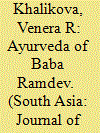

|
|
|
|
|
| Summary/Abstract |
This paper examines a cultural politics of nationalism and alternative medicine in India. It investigates the rhetoric of a popular guru, Ramdev, who criticises ‘the West’ and promotes ‘homegrown’ yoga and Ayurveda for strengthening individual bodies and the body of the nation. I argue that the expansion of the Ayurvedic market in India and Ramdev's personal success are both based on discourses that interweave a neo-liberal quest for health with nationalist sentiments and consumerist desires. I show how yoga and Ayurveda—situated within narratives of citizens’ duty to consume the homegrown—have become political tokens of national belonging and biomoral consumerism.
|
|
|
|
|
|
|
|
|
|
|
|
|
|
|
|
| 2 |
ID:
153013
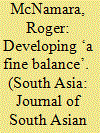

|
|
|
|
|
| Summary/Abstract |
This paper intervenes in the debate over whether secularism can protect religious minorities in India or whether alternative models are needed. I explore this issue by examining Rohinton Mistry's novel Family Matters, which focuses on religious extremism within the minority Parsi community. The novel suggests that the individual needs to maintain ‘a fine balance’ between religious beliefs and personal rights. It recognises that secularisation has shaped modern religious identity and, consequently, facilitated religious extremism. By de-coupling religion from secularisation, Mistry demonstrates that religion need not be rigid and can adapt to different social circumstances, while continuing to provide moral strength.
|
|
|
|
|
|
|
|
|
|
|
|
|
|
|
|
| 3 |
ID:
153012
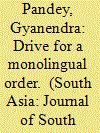

|
|
|
|
|
| Summary/Abstract |
This paper explores the changing contours of politics and democracy in our times by examining the ways in which populations and privileges are increasingly being distributed in cities and countries across the globe. In the light of these changing demographic and social conditions, it asks what are the appropriate terms for analysis of such population groups and their political aspirations, and suggests that we are working with outmoded analytical frames, concepts and languages that belong to another time. It goes on to a brief examination of the kinds of fault-lines that remain and that allow for a range of political initiatives and possibilities.
|
|
|
|
|
|
|
|
|
|
|
|
|
|
|
|
| 4 |
ID:
153015
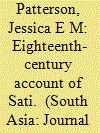

|
|
|
|
|
| Summary/Abstract |
Writing in the period 1765–79, John Zephaniah Holwell, temporary governor of Bengal, was one of the first British writers to attempt a scholarly engagement with Hinduism. Despite being an important source for several Enlightenment writers, his work has been misrepresented by current scholarship. In particular, his account of ‘voluntary sacrifice’, or sati, has been misunderstood as an example of eighteenth-century rationalism. This article will correct this by situating the account in a much fuller appreciation of Holwell's ‘project’, which can be broadly understood as an attempt to reconcile his own heterodox Christianity with what he termed ‘Gentoo’ doctrines. It will show how Holwell's insistence on the essential truth of ‘metempsychosis’ reveals an account of sati that is far more invested in presenting a particular reading of Indian religious principles than has hitherto been appreciated. This analysis challenges certain assumptions in the historiography of eighteenth-century European encounters with India, with a particular emphasis on intellectual culture.
|
|
|
|
|
|
|
|
|
|
|
|
|
|
|
|
| 5 |
ID:
153020
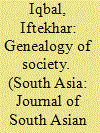

|
|
|
|
|
| Summary/Abstract |
This paper explores the anxious and sometimes hostile relationship between modern forms of civil society and non-modern institutions in Bangladesh. I argue that an uneasy relationship arises from civil society's inability or lack of initiative to identify and negotiate with ‘pre-modern’ social institutions and their remnants, which I conceptualise here as samaj. Such dissonance and disengagement have been historically constructed largely with regard to the way in which the roles of the state, capital and market forces have been conceptualised at the interface between ‘modernity’ and ‘tradition’. This proposition demands a genealogical understanding of the relationship between civil society and samaj, in which the latter is represented by religious institutions such as the khanqah and the madrasa.
|
|
|
|
|
|
|
|
|
|
|
|
|
|
|
|
| 6 |
ID:
153011
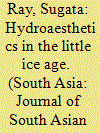

|
|
|
|
|
| Summary/Abstract |
Examining the visual tactics of framing flowing water in landscape painting and riparian architecture in Braj, a pilgrimage centre in North India where the god Krishna is believed to have spent his youth, the essay foregrounds a new conception of hydroaesthetics that emerged with the onset of the Little Ice Age (c. 1550–1850), a climatic period marked by catastrophic droughts and famines in South Asia. An engagement with the hydroaesthetics of beholding the river Yamuna's passage through Braj, the essay argues, brings to the forefront a reciprocal relationship between artistic practices based on a theological aesthetic of venerating the natural environment and ecological calamities. In doing so, the essay attempts to delineate a possible methodology for an ecological art history.
|
|
|
|
|
|
|
|
|
|
|
|
|
|
|
|
| 7 |
ID:
153018
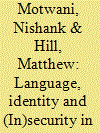

|
|
|
|
|
| Summary/Abstract |
This article revisits the Kashmir dispute by examining the interactions between language, religion and political dynamics to show how, in the post-1947 struggle, Kashmir's identity has increasingly been folded into the Indian and Pakistani language of a zero-sum conflict and nationalistic self-assertion. Paradoxically, Kashmir's position has weakened within a plural India even though Kashmir validates New Delhi's claim to religious and cultural heterogeneity. In Pakistan, Kashmir's diversity is dismissed because it disrupts Pakistan's unitary national identity centred on Islam and Urdu. By deliberately treating Kashmir as a homogenous Islamic entity, Pakistan seeks to attain legitimacy for its national imaginary as a pure Islamic state. Consequently, the capacity for Kashmir to actualise its own identity has diminished as it has been rendered hostage to the feuding of two behemoth ‘imagined communities’.
|
|
|
|
|
|
|
|
|
|
|
|
|
|
|
|
| 8 |
ID:
153016


|
|
|
|
|
| Summary/Abstract |
This article investigates the role of the media as a vehicle for societal debates on issues not amenable to conventional political mediations. By referring to the nuclear power plant in Kudankulam, Tamil Nadu, the article shows that although the security of the plant was a grave concern, and despite media attempts to substantively facilitate public participation in the discussions about the plant, the media failed to function as an alternative forum for debate. The article ascribes this limitation to the sub-textual mechanism at work in journalistic practices. The analysis leads to a reassessment of the information that the media presents for articulating potential tactics of protest.
|
|
|
|
|
|
|
|
|
|
|
|
|
|
|
|
| 9 |
ID:
153019
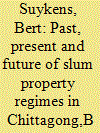

|
|
|
|
|
| Summary/Abstract |
This article argues for the need to take time into account when understanding land ownership in slums. It shows that this allows comprehending more accurately the place of land law and the specific forms that legal struggles over land take. Field research in a slum in Chittagong (in Bangladesh) reveals that while contemporary practices of ownership and transfer might appear to be informal and illegal, they are not only grounded in historical forms of legal land settlement, embedded in a long-standing court battle over legal ownership, but also the product of expectations related to the (legalised) future. Finally, urban planning, with a state-sponsored vision of the future of slums, further complicates the role of the law.
|
|
|
|
|
|
|
|
|
|
|
|
|
|
|
|
| 10 |
ID:
153014


|
|
|
|
|
| Summary/Abstract |
In the late nineteenth century, Anglo-Hindu and Anglo-Islamic inheritance law in British India treated women very differently. Anglo-Hindu inheritance law precluded women from both inheriting a portion of the estate and disposing of their property. Anglo-Islamic inheritance law allowed women to inherit property and did not restrict how they could use this property. The differing treatment of women by both systems allowed Anglo-Hindu inheritance law to encourage wealth accumulation, whereas Anglo-Islamic inheritance law encouraged estate fragmentation. An overview of both systems of inheritance law and case summaries illustrate how differences in the treatment of women affected the relationship between each system of inheritance law and wealth accumulation.
|
|
|
|
|
|
|
|
|
|
|
|
|
|
|
|
|
|
|
|
|